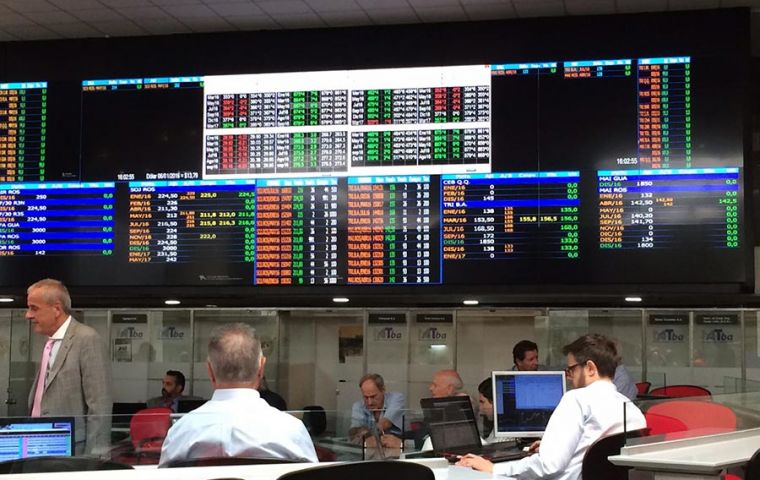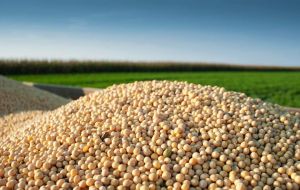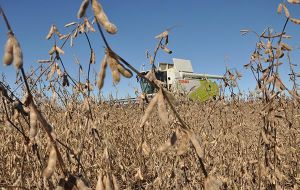MercoPress. South Atlantic News Agency
“An unforgettable year for soybeans in Argentina”, yields and harvested area at its lowest
 At 36 million tons, the national crop will be 37.4% smaller than the previous year, the Buenos Aires grains exchange said.
At 36 million tons, the national crop will be 37.4% smaller than the previous year, the Buenos Aires grains exchange said.  Average yields for the soon to be concluded 2017/18 harvest were expected at 2.14 tons per hectare while the harvesting area was seen at 16.8 million hectares
Average yields for the soon to be concluded 2017/18 harvest were expected at 2.14 tons per hectare while the harvesting area was seen at 16.8 million hectares  Argentina's Pampas grains belt was beset by extremely hot, dry weather from November until torrential rains paralyzed early harvesting in April.
Argentina's Pampas grains belt was beset by extremely hot, dry weather from November until torrential rains paralyzed early harvesting in April. Argentine soy yields and harvesting area have been chopped by drought to their lowest levels since the 2008/09 season, analysts said on Thursday, citing the effect of a four-month dry spell that suddenly gave way to floods in April.
Average yields for the soon to be concluded 2017/18 harvest were expected at 2.14 tons per hectare while the harvesting area was seen at 16.8 million hectares, the Buenos Aires Grains Exchange said in its weekly crop report. Argentina's Pampas grains belt was beset by extremely hot, dry weather from November until torrential rains paralyzed early harvesting in April.
“The weather was crazy. Right after the drought we had a series of extraordinary storms that lasted into May,” said Leandro Pierbattisti, an analyst with the country's grains
warehousing industry chamber.
“It was an unforgettable year for soybeans in Argentina, in a bad way,” said Pierbattisti, who agreed with the exchange's yield and crop area estimates.
The exchange left its 36 million ton harvest forecast unchanged. It estimated that 175,000 hectares, all in the bread-basket province of Buenos Aires, had yet to be brought in. At 36 million tons, the national crop will be 37.4% smaller than the previous year, the exchange said.
Argentina is the world's biggest exporter of soymeal livestock feed and soyoil, as well as a major supplier of raw soybeans, corn and wheat. The government expects this season's soy harvest to be 37.2 million tons. Crop estimates have dropped from around 55 million tons to below 40 million as drought damage is factored into calculations.
The Rosario grains exchange this month cut its harvest estimate to 35 million tons from an earlier 37 million-tons. The weak harvest has also robbed the government of export tax revenue it had been counting on to help close a wide fiscal deficit.
Argentina's economy shrank in April for the first time in more than a year, due to fallout from the drought. Argentina's agriculture sector plummeted 31% in April on a year-on-year basis, according to government data.




Top Comments
Disclaimer & comment rules-

-

-

Read all commentsThe usual stupid nonsense.
Jun 29th, 2018 - 10:47 pm +2The Kirchner administration induced the unfortunate soy“adventure” by violently taxing the farmers on e.g. meat production.
I was going to say that most of them had disappeared from the site completely, but judging by the downvotes there are at least two reading this thread but unwilling to stick their necks out and comment.
Jul 02nd, 2018 - 12:44 pm 0@Enrique
Jul 03rd, 2018 - 06:19 pm 0The study of history is meant to gain perspective, a.k.a, learn from past errors. Recent history on the other hand does imply a bigger emotional charge for most people. If we want to learn from our recent mistakes, let's say over the last 10 years or so, we must make a greater effort to overcome emotionally induced conclusions, while still acknowledging them, and strive for objectiveness at all costs. Keeping this kind of discipline when you combine short term political goals and mass media monetization, is almost impossible for the general public.
Academics on the other hand could sort out this eventuality without major difficulties if you keep politics out fo major universities. This way they will certainly be able to produce a list of facts and their most obvious correlations in a manner and language that would be understandable for most folks.
The question remains: Who would care to read those works when we're still sore from our recent world cup eviction and still throwing poop at each other over recent electoral results?
Commenting for this story is now closed.
If you have a Facebook account, become a fan and comment on our Facebook Page!